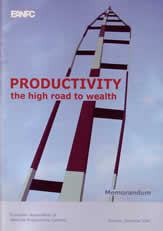

|
|
 |
4.7 Skills/qualifications In times of rapid economic and structural change, technological developments, continuously changing markets and tougher national and international competition, an enterprise’s productivity and efficiency depend increasingly on the deployment of a highly skilled workforce. In a situation in which enterprises world-wide operate at a technologically similar level, high skills have become a key competitive factor for productivity and economic efficiency. Efficiency and motivation, knowledge, skills and key qualifications (such as flexibility, cost-awareness, client orientation, meeting deadlines) need to be developed and used in all areas and for all jobs. This can only be achieved in enterprises which design and implement coherent policies and practices to enable their workforce to learn continuously and to develop company structures which enable the workforce to better meet the needs of their customers. There is a clear connection between the level of qualifications of the workforce and productivity development. On the one hand, working productively in the present technological, economic and organisational conditions prevailing within the Member States of the European Union demands a broadly skilled workforce. On the other, the existing skills and qualifications of the workforce limit the possibilities for the enterprise to react to the changing demands of the market. Thus, from an economic viewpoint, ‘human resources’ can no longer be understood as an elastic, technically substitutable factor, but rather a limitational factor on productivity, innovation and economic success. That means that it takes time for an employee to become qualified for his specific job in order to be optimally productive. Through on the job training and through encouraging colleagues to participate in more formal training to put that training in use workers disseminate knowledge and skills. Studies (LINK 2) show that this informal human resource development plays a large role in upgrading the skills of workers. Hence workers are essential in promoting a culture of upgrading of skills in the workplace. |
 |